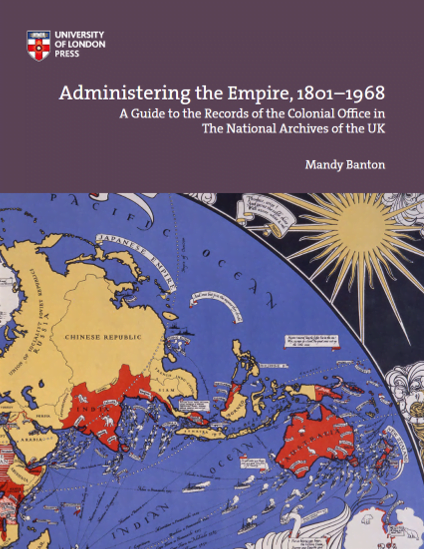With its origins in the mid-1500s, the British Empire at its fullest extent covered almost a quarter of the world’s land mass and ruled over a similar proportion of its peoples. Throughout most of the 19th and 20th centuries it extended over much of North America and the Caribbean region, great tracts of Africa south of the Sahara, the whole of the India subcontinent and Australasia, territories in South East Asia and the Pacific, and even for a time much of the Middle East.
In all these places Britain established local administrations to rule over the indigenous people and report back to central government in London. In the years before email, and even before the telegraph and the telephone, this generated a huge quantity of paper, most of which is now held in the UK National Archives (TNA) at Kew on the outskirts of London. Many government departments had some responsibility for empire affairs, but the most important was the Colonial Office. As a TNA staff member I worked with these records for 25 years and wrote the standard guide to their contents.

The book, previously available only in print, was reissued as an open access online edition in September 2020. It is available here.
Image credit: Mandy Banton, 2020.
My guide was originally designed to assist researchers able to visit TNA to study the papers. Hardly any of this huge collection has been digitised and made more widely available. But the book provides much information of more general interest. It describes the development and expanse of the British Empire, explains how dependencies were governed and the relationship between their administrators and London, the work of the Colonial Office and other UK government departments with a significant role in Empire affairs (such as the Foreign Office and the Admiralty), and, most importantly, the types and potential contents of the records.
There are letters, maps, photographs, newspapers, annual reports, proceedings of local legislatures and many more. The use of TNA’s online catalogue, which gives additional information, sometimes quite detailed, is explained.
Now that the guide is freely available to anyone with internet access its content is opened up to those who will never be able to visit TNA, and may have no interest in doing so, but who want to know what historical records relating to their own countries are held in London. A long appendix lists countries alphabetically giving brief details of their constitutional histories under the British and listing the categories and approximate numbers of the documents to be found for each.
Unlike the ‘migrated archives’ which form the subject of MBC’s important documentary film ‘Operation Legacy’, these Colonial Office records are not documents secretly removed from British dependencies at independence. They are the records amassed by a UK government department. But they do include a wealth of material sent to London over the centuries, copies of which are often not available in the now independent countries, and which Commonwealth citizens should be aware of.
Over the years many have argued that means should be found to make them widely available. As long ago as 1972, Dr Shitla Prasad, then director of the Indian National Archives, said, ‘Morally these records belong to the developing countries concerned, they are vitally necessary for reconstructing its history …’
This post was written by Dr Mandy Banton in October 2020. Mandy is a Senior Research Fellow of the Institute of Commonwealth Studies, at the School of Advanced Study, University of London. She was previously Principal Records Specialist (Diplomatic and Colonial) at The National Archives, UK.
Mandy’s guide can be accessed here: https://www.humanities-digital-library.org/index.php/hdl/catalog/book/administering-the-empire-1801-1968.
The University of London recently announced plans to permanently close the Institute of Commonwealth Studies. Academics from the Institute and beyond are opposing the decision given its essential work researching colonial and imperial legacies – you can read more here: https://www.commonwealthroundtable.co.uk/commonwealth/proposed-permanent-closure-of-the-institute-of-commonwealth-studies/.